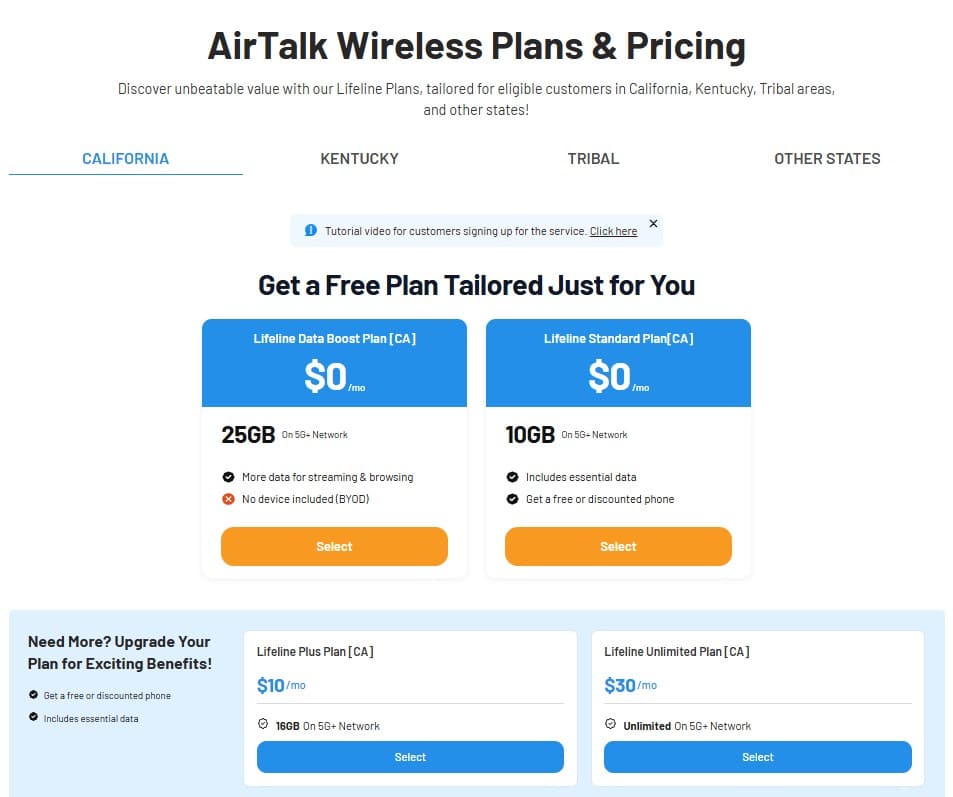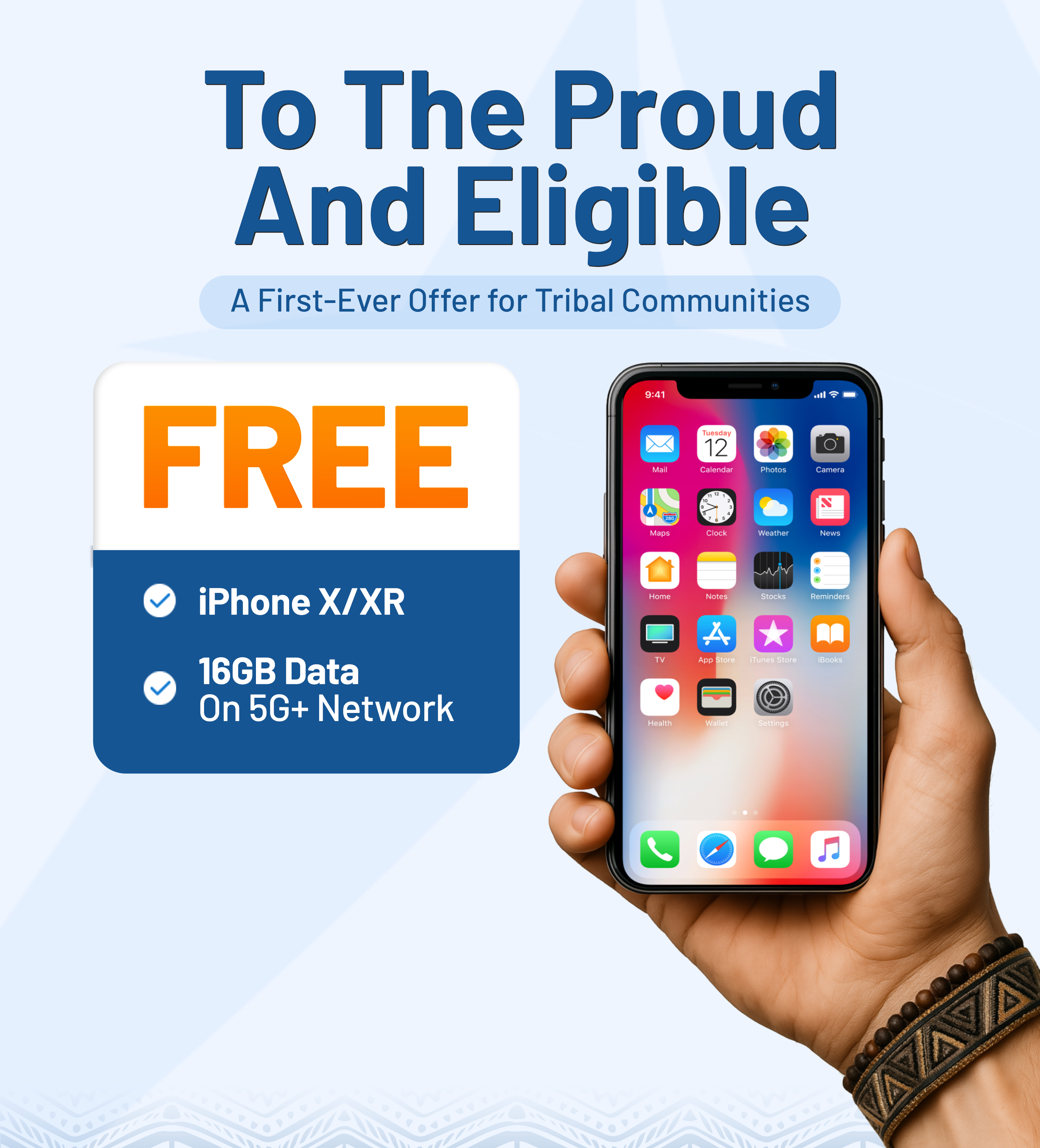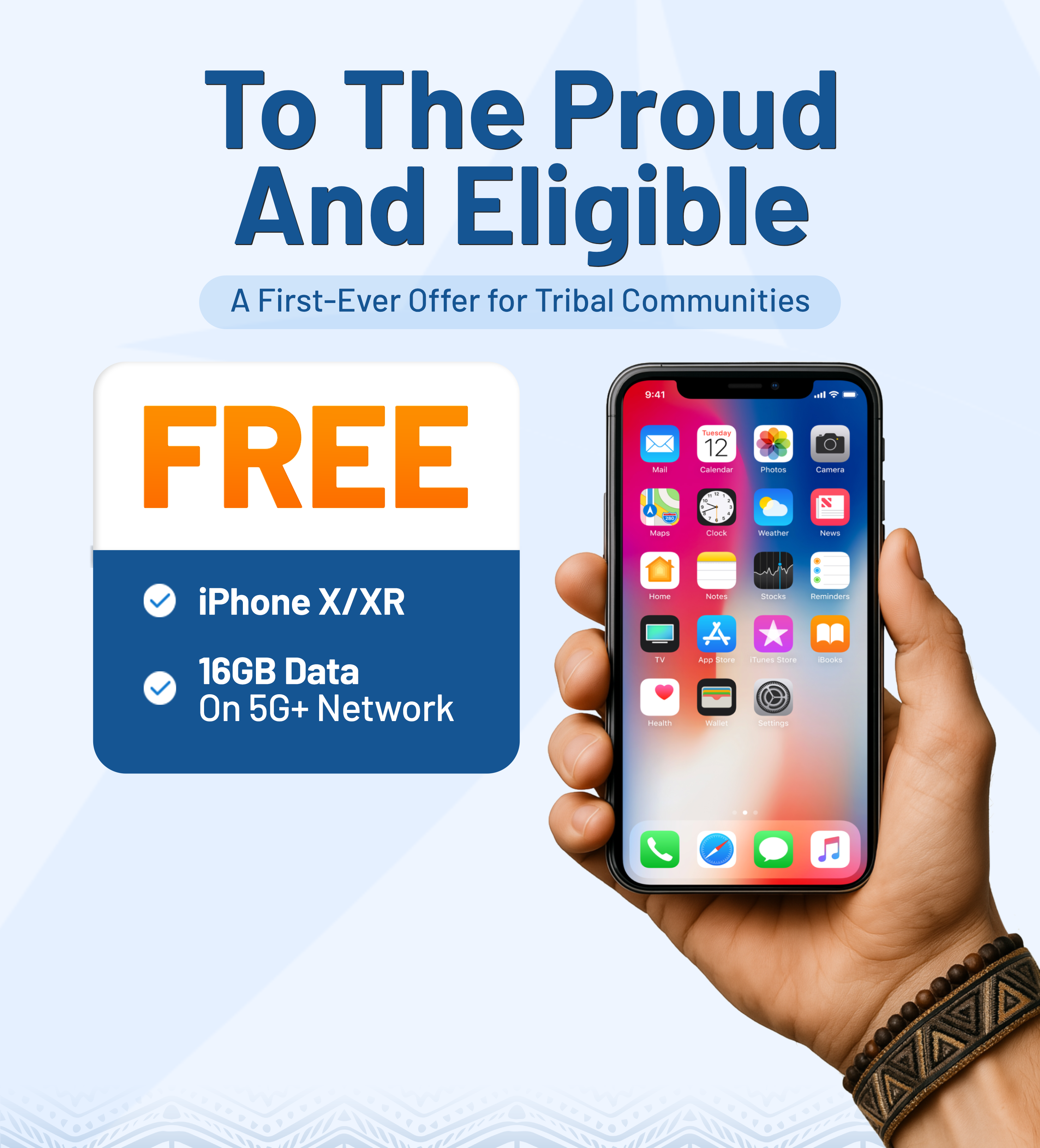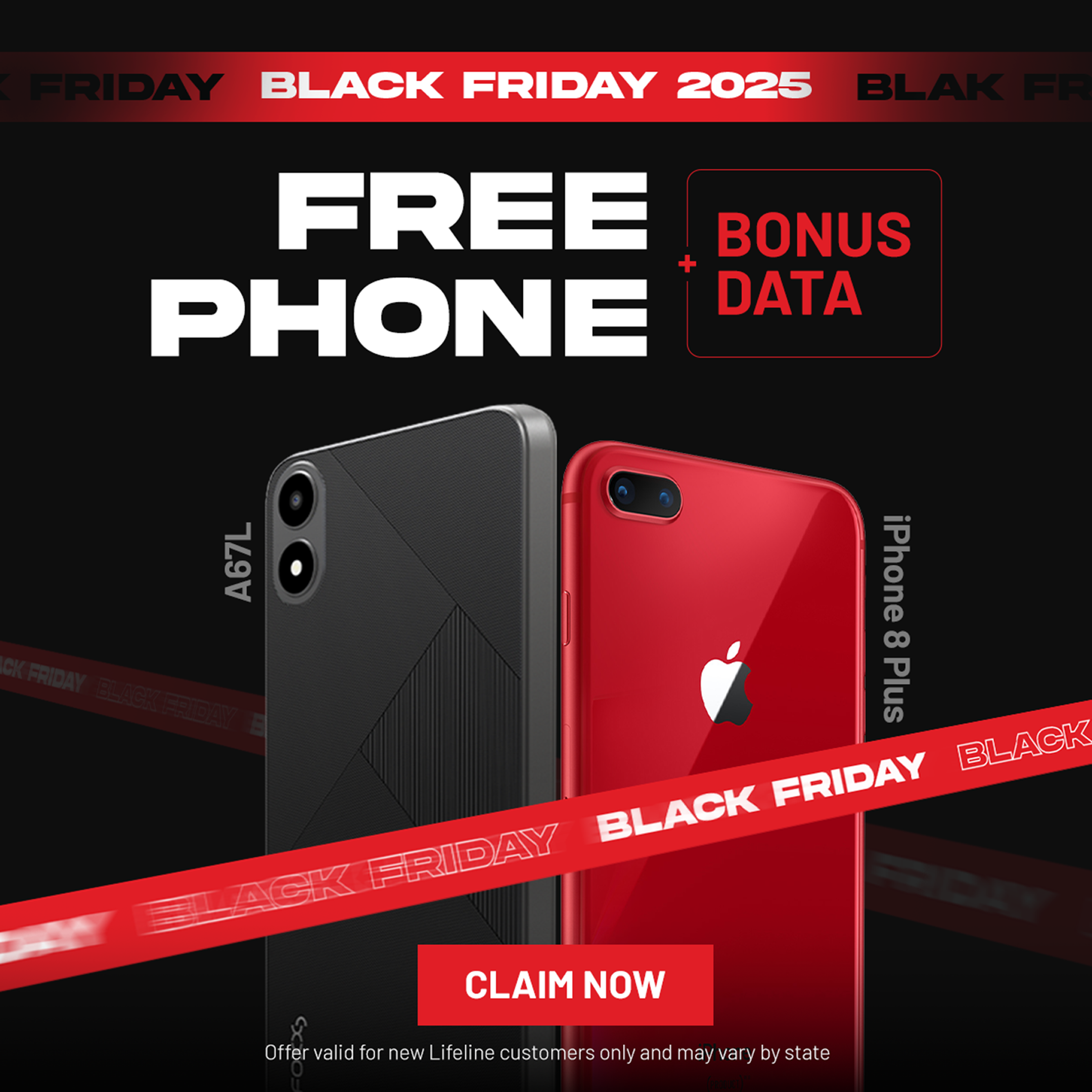If you really don’t care about “how can I get free cell phone service for free” or even a free phone, through the Lifeline program, take a moment to see who it truly helps:
- The single parent who needs to call about a job.
- The grandmother checking in on her grandkids.
- The student trying to keep up with classes.
- The person facing an emergency with no way to call for help.
Everyone needs to stay connected. We all have family, friends, and communities we want to reach, both near and far, through calls, text messages, emails, and social media.
Today, the internet also provides access to a vast range of information, news, research, and lifelong learning. Tasks like paying bills, shopping, managing finances, and booking medical appointments can now be done online.
1. The Lifeline Program – Free Cell Phone Service for Low-income Households
The Lifeline program is a federal initiative that makes phone and internet services more affordable for low-income households nationwide.
Lifeline participants can enjoy reliable phone or internet service at a lower monthly cost. Through this program, eligible consumers can receive a monthly discount of up to $9.25 on phone, internet, or bundled services.
For individuals living on Tribal lands, Lifeline offers an enhanced discount of up to $34.25 per month, which includes the standard $9.25 benefit plus an additional $25 Tribal benefit.
Qualified Tribal residents may also receive up to a $100 discount on first-time connection charges through the Link Up program, which helps cover the costs of initiating service.
The Lifeline program operates through participating phone and internet providers. When the Lifeline discount fully covers the cost of a provider’s service plan, the user can pay nothing for phone or internet service.
Lifeline service providers typically offer multiple plans to cater to various needs, including options for talk, text, and data.
Many plans also include extra benefits, such as a discounted or free cell phone (AirVoice A67L, iPhone 7, Samsung A42 5G, etc.), low-cost tablets, or other devices. Some providers may even offer bonus perks, including free internet calling.

2. How Can I Get Free Cell Phone Service for Free?
You or your household may qualify for Lifeline benefits in several ways:
Based on Income
Your household may be eligible if your annual income is at or below 135% of the Federal Poverty Guidelines for 2025. These limits depend on your household size and location:
| Household Size | 48 States, D.C., & Territories | Alaska | Hawaii |
| 1 | $21,128 | $26,393 | $24,287 |
| 2 | $28,553 | $35,681 | $32,832 |
| 3 | $35,978 | $44,969 | $41,378 |
| 4 | $43,403 | $54,257 | $49,923 |
| 5 | $50,828 | $63,545 | $58,469 |
| 6 | $58,253 | $72,833 | $67,041 |
| 7 | $65,678 | $82,121 | $75,560 |
| 8 | $73,103 | $91,409 | $84,105 |
| Each additional person: | $7,425 | $9,288 | $8,546 |
Through Federal or Tribal Assistance Programs
You can also qualify if you or someone in your household participates in any of the following programs:
- Supplemental Nutrition Assistance Program (SNAP)
- Medicaid
- Supplemental Security Income (SSI)
- Federal Public Housing Assistance (FPHA)
- Veterans Pension or Survivors Benefit
Tribal Programs (for residents on Tribal lands):
- Bureau of Indian Affairs General Assistance
- Head Start (only households meeting the income qualifying standard)
- Tribal Temporary Assistance for Needy Families (Tribal TANF)
- Food Distribution Program on Indian Reservations
Qualify as a Survivor Under the Safe Connections Act (SCA)
Survivors of domestic violence, human trafficking, or related crimes can qualify for discounted phone or internet service under the SCA.
You may be eligible if you:
- Meet existing Lifeline income or program requirements, or
- Have a household income at or below 200% of the Federal Poverty Guidelines, or
- Are enrolled in one of the following:
- WIC (Women, Infants, and Children Program)
- Free or Reduced-Price School Lunch or Breakfast Program, including CEP schools
- Federal Pell Grant (current award year).
Eligible survivors can receive up to 6 months of emergency Lifeline support, with their privacy fully protected.
Qualify Through a Child or Dependent:
You can qualify for Lifeline if your child or dependent participates in any of the programs mentioned above.
Additionally, some states, such as California and Texas, offer extra qualifying programs. Check with your state to see which programs may make you eligible.
If you qualify, you can apply online, by mail, or through a participating phone or internet company. Once approved, you’ll be able to receive discounted or free cell phone service and even a free government phone to help you stay connected.

3. Step-by-Step Guide: How to Get Free Cell Phone Service and a Free Phone
AirTalk Wireless is one of the most popular licensed Lifeline providers.
The company is well-known among Lifeline customers who are looking for a free phone along with free or discounted monthly service. AirTalk offers a wide selection of devices, including smartphones, tablets, smartwatches, and device bundles.
In addition, when you sign up for Lifeline directly with AirTalk Wireless, you can enjoy free international calling to over 200 countries and territories, unlimited talk and text, and many other benefits.
Step 1: Visit the AirTalk Wireless website
Visit the AirTalk Wireless website and enter your local ZIP code. This will show which Lifeline plans and free device offers are available in your state.
Step 2: Choose the Lifeline Plan
AirTalk Wireless offers several Lifeline plans to suit different needs:
- Lifeline Standard/Basic Plan (100% Free): This is the best free plan and includes a free cell phone. It provides 5–16 GB* of data per month (amount varies by state).
- Lifeline Data Boost Plan (Bring Your Own Device) (100% Free): Ideal for those who already own a compatible phone, this plan offers up to 30 GB* of free data per month (varies by state).
- Lifeline Plus, Premium, Unlimited Plan (Paid Plan): For users who need more data, AirTalk offers plans with higher data allowances on a 5G+ network. These plans also include a free device with your service, combining high-speed internet access.
*Offers may vary and are subject to future updates.

Step 3: Pick a Free Phone
If you pick a Lifeline plan with a free phone offer, then browse through the available free or discounted devices. AirTalk often offers:
- Discounted or free iPhones and Android smartphones
- Low-cost tablets (such as iPads and Android tablets)
- Smartwatches available at a minimal cost
- Device bundles (e.g., phone + tablet or phone + smartwatch deals)

Availability varies by state and current inventory.
Step 4: Upload Verification Documents (If Required)
If your eligibility isn’t automatically verified, please upload the required documents.
Depending on how you qualify and the requirements of the Lifeline Administrator, applicants may need to provide one or more of the following:
Proof of Program Participation:
If you qualify through a government assistance program (e.g., Medicaid), you may need to provide documentation such as:
- Benefits award letter
- Official program approval letter
- Benefits card with your name
Note: EBT cards alone are not accepted as proof of program participation.
Proof of Income:
If you qualify based on income, acceptable documents may include:
- Recent pay stubs
- Tax returns
- Social Security statements
- Unemployment benefit letters
Proof of Tribal Eligibility:
If you are applying under the Tribal Lifeline program, you may need to provide:
- Tribal ID card
- Proof of participation in qualifying Tribal programs, such as TANF or Head Start
Proof of Identity and Address (sometimes required):
Applicants may also need to submit:
- Valid government-issued photo ID
- Utility bill, lease, or other official document showing your current address
Step 5: Submit Your Application
Submit your application through the AirTalk Wireless online portal. You’ll receive a confirmation once your application is submitted.
After approval, your phone will be shipped directly to your address, often within a few business days.

NOTE: The government does not subsidize devices. Lifeline programs cover basic service costs only. Free or discounted devices, upgrade plans, or top-ups are exclusive benefits provided by AirTalk Wireless as part of our promotional offers. Terms and conditions apply. Limited-time promotion—offers vary by state, stock availability, and eligibility.
4. Important Notes
#1 – Eligibility is Required
Only consumers who meet the eligibility criteria can enroll in the Lifeline program.
#2 – One Benefit Per Household
Each household is limited to one Lifeline benefit, which is a monthly discount on phone or internet service. A household is any group of people who live together and share income and expenses, regardless of whether they are related.
#3 – Non-Transferable Benefit
The Lifeline benefit can only be used by the qualified subscriber. It cannot be given to anyone else.
#4 – Use Your Service at Least Once Every 30 Days
To keep your Lifeline service active, you must use it at least once a month – make a call, send a text, or use data. Inactive accounts may be terminated.
#5 – Annual Recertification Required
You must recertify your eligibility each year to continue receiving your service.
If your eligibility can be verified automatically, no action is needed. If not, you will receive a notice by email or mail, sometimes with additional reminders, instructing you to recertify within 60 days to keep your benefit.
Recertification can be completed online, by mail, or by phone.
If you fail to recertify on time, your Lifeline benefit may be suspended, your service could be turned off, and your monthly bill may increase. If this happens but you still qualify, you can reapply to restore your benefit.
#6 – Be Honest on Your Application
Providing false information on your application is a federal offense. Misrepresenting household size, income, or program participation can result in permanent removal from Lifeline.
Always provide accurate and up-to-date information, and be ready to submit proof of eligibility if required.
#7 – Keep Your Information Up-to-Date
Notify your provider within 30 days if your contact information, address, or eligibility status changes. This includes changes in household income or if you are no longer enrolled in a qualifying program. Keeping your records current ensures uninterrupted service and compliance with program rules.
#8 – Keeping Your Current Phone Number
If you prefer, you can absolutely keep your current phone number when switching to a Lifeline service provider. It’s important not to cancel your service with your current provider. Your phone number must be active to transfer it.
When signing up for Lifeline, be sure to inform the new provider that you want to keep your existing number. The new Lifeline provider will handle the entire number transfer process with your old carrier.
>>> Keep Your Number, Get Lifeline Benefits!
#9 – Do I Need a Contract?
You can use the Lifeline service without long-term commitments or early termination fees. You only need to maintain eligibility and use your service at least once every 30 days to keep it active.
#10 – What Happens if I Stop Using the Service?
If you stop using your Lifeline service for more than 30 days, your account may be deactivated or terminated. To keep your service active, simply make a call, send a text, or use data at least once every month.
#11 – Hidden Fees or Activation Costs
Generally, authorized Lifeline providers do not charge activation, enrollment, or application fees for basic service. When you apply with AirTalk Wireless, you are guaranteed no long-term contracts, no hidden fees, no provider monthly fees, no enrollment fees, no activation fees, and no early termination fees.
However, if you select a plan or device that exceeds the basic options, you may face additional costs (which are not hidden fees):
- Upgraded/Premium Plans: Providers may offer plans with more data or minutes than the free, basic cell phone service plan. You will be charged a monthly fee for these plans. This is optional.
- Upgraded Devices: More advanced smartphones require a fee. This fee should be clearly stated at enrollment.
- If you need to purchase extra data, minutes, or international calling/texting beyond what your chosen plan offers, you will need to buy “top-ups” or “add-ons.”
Conclusion
As of today, millions qualify for Lifeline and similar programs, but many still only have basic minutes or no smartphone at all. If you know someone who might qualify, inform them or assist them in applying for free cell phone service and a free device. Share this post!


